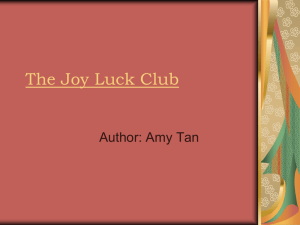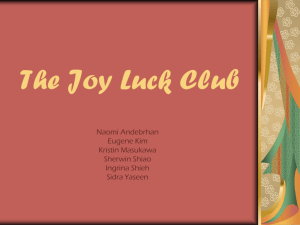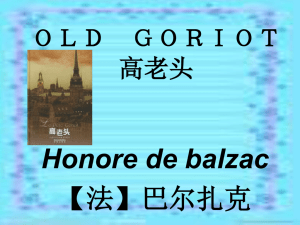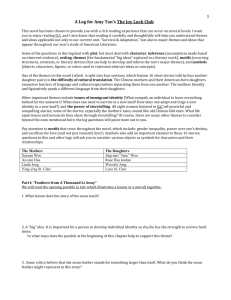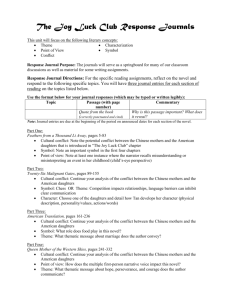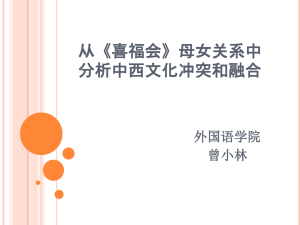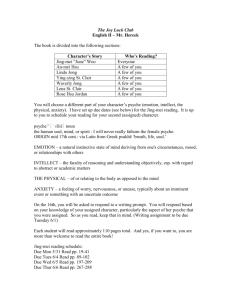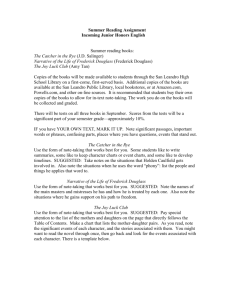JLC Notes
advertisement
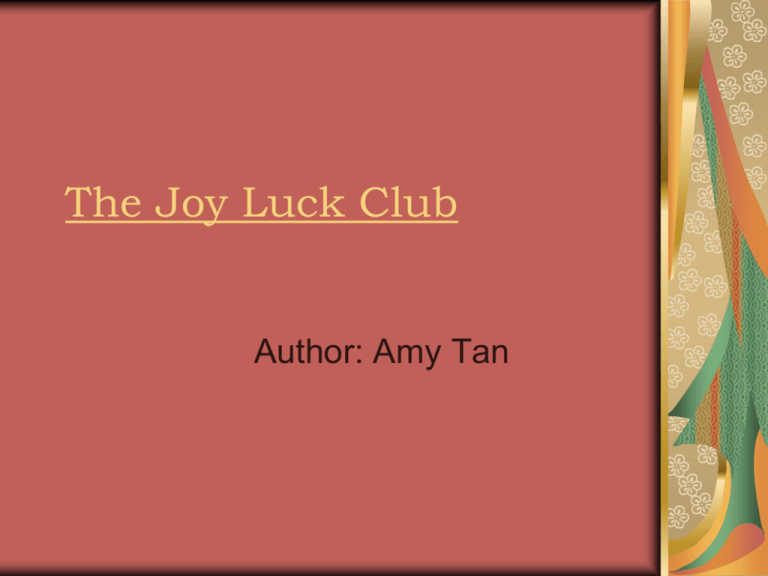
The Joy Luck Club Author: Amy Tan About the Author Born in Oakland, California Grew up in San Francisco Other works include: The Kitchen God’s Wife, The Hundred Secret Senses, and The Chinese Siamese Cat. Setting The stories of the daughters take place in San Francisco. The stories told about the mothers are told from different parts of China including Hong Kong, Shenzhen, and Guangzhou. The stories of the women date back to the 1910s when the mothers were born up to the 1980s when the daughters are grown. History of the Joy Luck Club Suyuan Woo founded the club. It began in China as a way for women to come together and celebrate life during the Japanese attacks (WWII). The San Francisco chapter is made of four Chinese ladies who came to America to start new lives and escape their tragic pasts. The club’s activities include a large meal and then a competitive game of mah jong – a game of dice and tiles. Stories are told around the table during the game which is ultimately what the book is about – a compilation of all the women’s life stories. Maj Jong Characters Mothers Suyuan Woo An-mei Hsu Lindo Jong Ying-ying St. Clair Daughters June Woo Rose Hsu Jordan Waverly Jong Lena St. Clair Suyuan Woo Sits at the East of the table This is where things begin She is the founder of the Joy Luck Club She wants only the best for her daughter be sometimes becomes overly critical When the Japanese attack she is forced from her home and wanders for days with her twins strapped on her back She must leave them on the street, and never see them again She dies at the beginning of the book leaving her daughter to take her place in the club and to find her lost twins. Jing-Mei/June Woo Daughter of Suyuan Woo Her mother pushed her to be a child prodigy at the piano when she was little but she never wanted to be anything but normal She has no desire to be married or finish school June becomes an advertising agent June and Waverly are in constant competition Auntie An-Mei Sits at the south When she was younger her mother was tricked into being a concubine for a rich man after her father died. In her unhappiness, her mother commits suicide An-mei too becomes overly critical and controlling of her daughter Rose Hsu Jordan Daughter of An-Mei When she was young the family took a trip to the beach and Rose was left in charge of watching her brothers. Her youngest brother drowned and she forever lives in the memory of the guilt. When she was an adult, her husband, Ted, left her for another woman. Instead of keeping silent like her culture required, she stood up for herself and hired a lawyer in order to keep the house. Lindo Jong Sits in the west Was forced into an arranged marriage that was decided at her birth Her mother-in-law despised her because she wouldn’t have a son. She found out a way to get out of the marriage by tricking the family into thinking the contract was not valid. She went to America She is a very proud woman and is not happy when her daughter is embarrassed by her. Waverly Jong Lindo Jong’s Daughter Waverly was a child prodigy of chess. She won many tournaments and her mother became obsessed with her success. Fed up with her mother’s bragging, Waverly quits As an adult Waverly’s husband left her with a young daughter and she has now met a new man in the same law firm. Rich, her fiancé, doesn’t make a good impression on the strict Chinese family, but is accepted anyway. Waverly is resentful at her mother’s ability to only look at the negative. Ying-Ying St. Clair Sits in the North Ying-ying was a spoiled child, spirited and full of life. When she becomes sixteen she believes that she can see the future. She marries a man who is significantly older than she who leaves her for a dancer. In her hurt she shuts herself off from love She comes to America where she meets her second husband and has Lena Lena St. Clair Her mother tells her that if she doesn’t eat all of her rice her husband will be pock faced. To keep away from a boy down the street she quits eating so that he would be so sick he would die. The boy died of measles. Lena became anorexic. Later she married a man from her same architecture business who added up all the bills and tallied up who spent what. This caused many disagreements between the two. Conflict Mother vs. Daughter: Each daughter struggled with her mother’s expectations and criticalness. Daughters vs. Culture: The mothers were not allowed to marry again after their husbands left or died without adding shame to their families. Yet the daughters were all going through divorces, remarriages, or not wanting to be married at all Mother vs. American Culture: Each mother had to cope with the changes that they saw in America and the effect America had on them Major themes The Difference of ancient Chinese culture and American Culture “Chinese people had Chinese opinions, and American People had American Opinions. Usually the American opinion was better.” –Rose “I was raised Chinese way: I was taught to desire nothing, to swallow other people’s misery, to eat my own bitterness” –Anmei The daughters defy their mothers, find jobs, divorce, and get their hair cut by homosexuals. The mothers are critical and only want the absolute best for their daughters Chinese pride/Overachievement American Laziness Ying gets a job at a fortune cookie factory. She meets An-mei there and they laugh at the funny quotes that Americans think they use on a regular basis. Themes Cont. Struggle between religion and superstition “My mother believed in God’s will for many years. She said it was faith that kept all these food things coming our way, only I thought that she said, ‘fate,’ because she couldn’t pronounce that, ‘the,’ sound in ‘faith.’ And later I discovered that it was fate all along. Some believed that they could tell the future If a house was slanted a wrong way the baby would die If your earlobe is big then you will have a lot of wisdom If your nose is long then you will have riches Yet they all went to church with the missionaries in San Francisco Themes Cont. No matter how a daughter is raised she will become her mother “And even though I taught my daughter the opposite she came out the same way! Maybe it is because she was born to me and she was born a girl. And I was born to my mother and I was born a girl. All of us are like stairs, one step after another, going up and down, but all going the same way.” –An-mei Waverly fights her own desire, instilled by her mother, to be critical of her new husband. Rose fights her urge to be silent and allow her husband to walk out on her as her mother stayed silent when her mother died. Lena fights for equality in her marriage just as Ying-Ying fought to keep her freedom as a child Women were suppressed in both cultures. All the women were expected to hold their tears and take what fate had dealt them. Style Vocabulary/diction: Tan used a lot of dialogue to express the tension between the characters and the difficulty of the language barriers. She incorporated Chinese words into her dialogue and then defined them to add effect to the themes. Hulihuda: confused Heimongmong: dark fog Ying-Ying’s second husband didn’t know how to propose so he asked if her he she would spouse him. (a word he found on a fortune cookie placed by Ying) When the characters were not using Chinese words the mothers all had strong dialects “A mother is best. Mother see inside of you.” –An-Mei “Aii, so much money, so much. Descriptive language Tan described things in a unique way She didn’t use a lot of sensory detail but rather described the feelings of the characters. When reading the book, you could not see the place that action was happening without imagination but you could feel the despair that was taking place within the character. – “I felt numb, strangely weak, as if someone ad unplugged the current through me.” She described the characters’ traits by presenting their actions. – “Sometimes she would start to make dinner, but would stop half way, the water running full steam in the sink, her knife posed in the air over half-chopped vegetables, silent, tears flowing.” The characters used many illustrations – “It was as if he were running to catch things before they fell, only he would fall before he could catch anything. Sentence Structure When the daughters are speaking they use long sentences, with several commas and sometimes run-ons. This is to point out the fluency of their English. When the mothers speak they have short, choppy sentences and sometimes fragments Order of events They were sporadic and sometimes hard to follow but this added to the story telling affect. Each group of stories had an overall theme.
